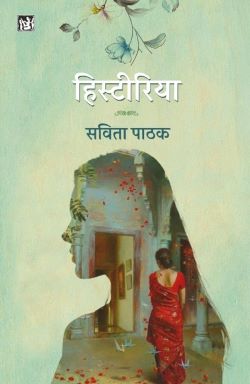
Literature holds a mirror to society and pushes us to investigate our narrow mindsets. All of us are products of the socio-cultural milieu we grow up in which significantly impacts our interactions with the world. Shedding off inherited lessons of discrimination and biases is often difficult when left unaddressed. Literature, and arts in particular, then, has the onus to propel an individual towards personal and social change. Savita Pathak’s first story collection Hysteria is one such book that busts several myths around women that have been more or less accepted as ‘normal.’
The cover page depicting a woman looking (back) at the threshold, stands testimony to several hurdles she must have crossed to gather the strength to tell her story. Through seventeen distinct stories, this collection depicts an acute understanding of caste, class and gender hierarchies prevalent in the North Indian belt.
The socio-temporal setting of the story collection can be attributed to parts of the present Eastern UP and Bihar. Landscapes shift, prevalent dialects change, characters are being sifted about, but the common theme stands out. She writes as an ‘organic intellectual’ who doesn’t only ‘know’ but has lived through these realities mediated by dualities of all kinds and hasn’t looked at it through a sanitized lens of books and cinema. Therefore, the idioms, proverbs and even sarcasm, which form an important dimension in the book, come naturally and effortlessly to her.
The first and the titular story challenges the myths around hysteria which has long been assumed as a sex-related ailment. In depicting the story of Archana’s repressed desires of educating herself, finding a job and leading a respectable life, the author ably uncovers the mass hysteria of society hell bent on declaring women hysterical if they try to transgress the accepted boundaries of feminine behavior.
Body Language draws an efficient caricature of the Placement Trainer, Mrs. Ghosh,who emphasizes on the importance of body language every now and then. The author here delves deeper into the politics of the market driven education system that only creates a homogenous army of job seeking individuals devoid of their individualityEmployment remains a distant reality, available only to a selected few.
Hindustan Ka Dil, the final story of the collection, can very well be considered as the heart of this collection. Chand and Soni dare to love despite the social restrictions. This story of love, resilience and hope keeps you on edge till the very end. Its hopeful ending restores faith in the essential humanity of human beings.
In “Arja Tumhari Kaun Hai”, the author attacks the religious myths where women are always at the receiving end despite no fault of their own. From Arja to Bhawari Devi, we have come a long way but the victim blaming and victim shaming hasn’t stopped till today. Through Arja, the narrator depicts a story of persistent struggle to survive and seek justice for oneself instead of succumbing to social pressures. She decides to live on and ask difficult questions from powers that be. With an efficient juxtaposition of myths, historical past and present, this story stands out as one of the best stories of this collection.
In totality, the text brings out a brilliant concoction of emotions and pathos where each story transports you into the world of its own. This is a coming-of-age narrative where the narrator moves from micro to macro level in order to unearth the stories of women repressed in subtle and not-so-subtle ways.
The female gaze of the narrator is not restricted only to the issues concerning women. It goes on to make important observations about larger issues impacting Indian society today. Such issues range from politics of development, climate change, rapid degradation of educational institutions, corruption, and communalism, etc. In making this transition from personal to social and from local to national concerns, the author showcases a deep engagement with her socio-cultural realities. The sequencing of the stories could be better. At times, the landscape shifts erratically, disrupting the flow of the narrative. However, such minor errors can be overlooked when the text has the potential to initiate a much-needed debate around the stereotypical representation of women. Hysteria, a slim text spanning over 150 pages, that can be covered in one or two sittings, is definitely worth your time.
Hysteria, a slim text spanning over 150 pages, that can be covered in one or two sittings, is definitely worth your time.
Pratibha Kumari is presently working as Assistant Professor in the Department of English, Sri Aurobindo College, University of Delhi. She completed her M.Phil from University of Delhi in 2017. Her interest areas are Indian Postcolonial Literature, Trauma Studies and Dalit Literature in Translation. Her current research is focused on locating and analyzing the marginalized narratives of Partition. As a passionate reader, she loves to engage with fiction and non-fiction alike.

Subscribe to our newsletter To Recieve Updates
Join our newsletter to receive updates